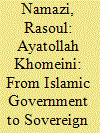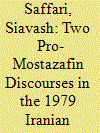| Srl | Item |
| 1 |
ID:
165772


|
|
|
|
|
| Summary/Abstract |
This paper argues that the mature form of the political doctrine of the Ayatollah Khomeini (1902–89), Iranian Shiite religious authority and architect of the Islamic Republic of Iran, grew out of an encounter with the modern understanding of the state and the concept of sovereignty. Khomeini’s political doctrine, called the Absolute Guardianship of the Islamic Jurist, although based on a religious foundation, should be studied as a break with the traditional understanding of political power in Shiism. It will be argued that such a political doctrine can play the same role as the Christian rhetoric of the early modern political thinkers played, pave the way for modernization of Shiite political thought, and prepare the ground for a modern temporal conception of politics.
|
|
|
|
|
|
|
|
|
|
|
|
|
|
|
|
| 2 |
ID:
154693


|
|
|
|
|
| Summary/Abstract |
A number of studies have examined the role of the economically marginalized classes in the 1979 Iranian Revolution and the events which transpired in its immediate aftermath. It has been suggested that the mass mobilization of these classes, often referred to collectively as the mostazafin (downtrodden) in the official literature of the Islamic Republic, was instrumental in the success of the revolution and the subsequent establishment of the Islamic Republic under the leadership of Ruhollah Khomeini. The present paper contrasts Shi’i liberation theology and Shi’i Islamism as two distinct pro-mostazafin discourses that emerged in mid- and late-twentieth century Iran, and which facilitated the participation of the lower- and under-classes in the revolutionary movement. It argues that while it was developed originally by Shi’i liberation theologians, Islamist forces were able to successfully appropriate the pro-mostazafin discourse and gain the support of the economically marginalized classes in the crucial final phase of the revolution, and in doing so create an important social base for their political power.
|
|
|
|
|
|
|
|
|
|
|
|
|
|
|
|